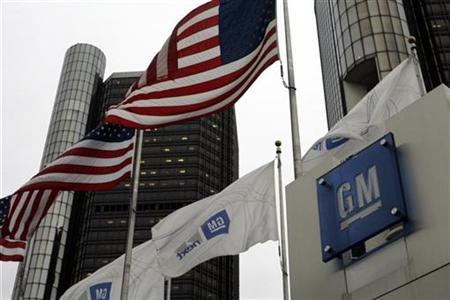Jan. 5 (Bloomberg) — General Motors Corp.’s U.S. sales plunged to a 49-year low in 2008, dragged down by a 31 percent slide in December as demand was ravaged by the recession and concern that the biggest domestic automaker might collapse.
Toyota Motor Corp.’s U.S. deliveries plummeted 37 percent last month, while Honda Motor Co. slipped 35 percent, Ford Motor Co. fell 32 percent and Nissan Motor Co. was down 31 percent, pointing toward the industry’s worst annual volume since 1992. Chrysler LLC dived 53 percent.
Related articles:
– Auto sales plunge again in December (CNN)
– Bleak US sales in December cap a grim year for automaker (IHT)
– US Auto Sales Plunge Whopping 36 Percent in Dec. (AP)
The federal rescue of GM and Chrysler couldn’t overcome buyer pessimism and tight credit in the world’s biggest auto market. Ford’s 2008 U.S. sales sagged to a 47-year low, while GM’s total of 2.95 million light vehicles was the least since 1959, according to trade publication Automotive News.
“It’s one of the worst years ever, and this year will be worse,” said Stephanie Brinley, an analyst at consulting firm AutoPacific Inc. in Southfield, Michigan. “It’s not a gas problem. It’s not a credit problem. It’s a consumer confidence problem, and it’s worldwide.”
GM and Chrysler received commitments last month for as much as $17.4 billion in U.S. loans, saying they would have run short of operating cash by this month.
GM’s results last month beat the average estimate of a 41 percent drop among six analysts surveyed by Bloomberg News. Tempering the decline was a 43 percent surge in deliveries of the Chevrolet Malibu sedan. Sales of GM’s Saab brand, which the Detroit-based automaker says it may sell, fell 57 percent.
U.S. Market Share
Thanks to bigger declines throughout 2008, the U.S. automakers will likely mark the first calendar year where their combined market share was less than 50 percent, based on results through November, when they held 47 percent.
The drop in full-year U.S. sales for Toyota and Honda were the first for the Japanese automakers since 1995 and 1993, respectively.
Toyota failed to get a boost from no-interest loans offered on most of its models since Oct. 2. Sales of its Prius hybrid, the best-selling gasoline-electric car in the U.S., declined 45 percent. The Tundra full-size pickup dropped 52 percent, while Toyota’s Lexus luxury brand finished the month down 32 percent.
Industrywide Decline
Industrywide U.S. sales extended a streak of declines of at least 25 percent dating to September. Vehicle sales for the year likely will total slightly more than 13 million, based on estimates from a Bloomberg News survey of 22 analysts and economists.
While that annual total would be the lowest in 16 years, it doesn’t reflect the steepening slide in U.S. auto demand.
Last month’s seasonally adjusted annual sales rate probably was 10 million, a 39 percent decline, based on the Bloomberg survey. The November rate was 10.2 million, and annual sales for all of 2007 were 16.1 million.
“We are at the bottom now,” said Tom Libby, an automotive analyst at consumer-research firm J.D. Power & Associates in Troy, Michigan. “People have just stopped buying and I don’t blame them. When you have such a decline in savings and net worth, it just doesn’t surprise me sales have fallen so much.”
Sales of Daimler AG’s Mercedes-Benz and Smart minicar fell 24 percent in December. Volkswagen AG was down 14 percent, while its Audi unit was off 9.3 percent. Bayerische Motoren Werke AG’s sales of BMW- and Mini-brand autos fell 36 percent.
Weak Economy
U.S. jobless rolls reached a 26-year high in the week ended Dec. 20, signaling a worsening labor market as the economy heads into the second year of a recession. That weakness adds to the strain on automakers after record fuel prices in 2008’s first half damped demand for full-size pickups and sport-utility vehicles.
President-elect Barack Obama has made an economic stimulus package his top priority, and he told reporters today in Washington that the nation faces an “extraordinary challenge” in reviving growth.
“The sooner stimulus efforts find their way to where they’ll do the most good — into the hands of consumers — the sooner we’ll see a turnaround in confidence levels and a return of buyers to the marketplace,” Jim Lentz, president of Toyota’s U.S. sales unit, said in a statement today.
December’s plunge may have been eased by the resumption of low-cost financing from GM last week, auto-research firm Edmunds.com said, citing a surge in vehicle inquiries on its site and dealer surveys.
Ford’s U.S. sales were “strong” in the last two weeks of December, Executive Vice President Mark Fields told reporters today in Dearborn, Michigan, where the automaker is based. Ford discounted its remaining F-150 pickups from the 2008 model year after a redesigned version debuted in October.
GM, Chrysler Rescue
Consumer concern that Detroit-based GM and Auburn Hills, Michigan-based Chrysler would fail to get government aid and be forced into bankruptcy may have contributed to December’s slump, Patrick Archambault, a Goldman, Sachs & Co. analyst based in New York, said in a Dec. 28 research note.
President George W. Bush announced Dec. 19 that GM and Chrysler would get the emergency loans in exchange for restructuring their businesses. GM had said it might run out of operating funds by the end of 2008, while Chrysler had said it might fall short by the middle of this month.
GM had resisted demands by some U.S. lawmakers that it file for bankruptcy instead of pursuing federal loans, saying buyers wouldn’t trust a car company under court protection.
To contact the reporters on this story: Mike Ramsey in Southfield, Michigan, at [email protected]; Alan Ohnsman in Los Angeles at [email protected]
Last Updated: January 5, 2009 15:22 EST
By Mike Ramsey and Alan Ohnsman
Source: Bloomberg
